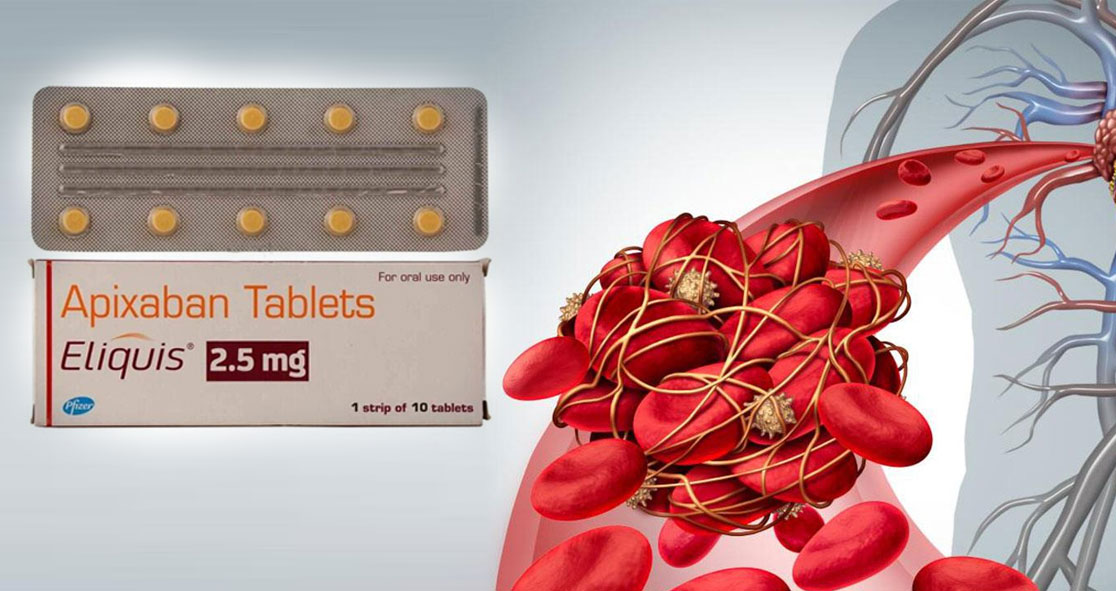Apixaban, the active ingredient of Eliquis, is a prescription-only drug that comes as an oral pill. It is used to prevent serious blood clots from forming due to a certain irregular heartbeat (atrial fibrillation) or other conditions, according to WebMD.
The drug lowers the risk of blood clots and stroke in patients with atrial fibrillation. Apixaban also prevents blood clots in the lower extremities – the condition called deep vein thrombosis (DVT). Furthermore, it prevents pulmonary embolism (PE), which is a blood clot in the lungs, after hip or knee replacement surgery.
Apixaban belongs to a class of drugs called anticoagulants (blood thinners). It specifically blocks a substance called factor Xa. The drug helps to prevent blood clots from forming by blocking factor Xa, decreasing the amount of the enzyme thrombin in the blood. Thrombin causes platelets in the blood to stick to one another, forming clots. Decreasing thrombin is important to prevent a clot.
Dose and Strength
The recommended dose of apixaban for most patients is 5 mg twice daily. Doctors may advise apixaban 2.5 mg twice daily in patients who are aged 80 and above, with bodyweight less than or equal to 60 kg and serum creatinine level greater than or equal to 1.5 mg/d, according to Rx List.
For the prevention of DVT, doctors recommend apixaban 2.5 mg twice daily. The first dose is advised 12 to 24 hours after surgery. For the treatment of DVT and PE, the recommended dose of apixaban is 10 mg twice daily for the first 7 days and then 5 mg twice daily.
Side Effects
Some of the common side effects of apixaban are nausea, easy bruising, or minor bleeding, such as nosebleed, bleeding from cuts, according to WebMD. Most people who use this blood thinner medication do not experience serious side effects.
Seek immediate medical attention if you notice any signs of serious bleeding, such as unusual pain or discomfort, unusual bruising, prolonged bleeding from cuts, nosebleeds, unusually heavy menstrual flow, blood in urine, coughing up blood, or black stools.
Precautions
People allergic to apixaban should never take Eliquis. Before using this anticoagulant, tell your doctor your medical history, especially if you have liver disease, kidney dysfunction, bleeding problems, blood disorders, or any clotting disorders. Also, tell your doctor the medications you have been taking to prevent drug interactions.
Apixaban may cause gastrointestinal (GI) bleeding so avoid alcohol during treatment, as it may increase your risk of GI bleeding. The drug can cause bleeding so to lower the risk of getting cut, bruised, or injured, make sure you take extra precautions while using sharp objects.
Is there a generic version of apixaban?
Currently, there is no generic Eliquis available in the United States. In January 2020, the U.S. Food and Drug Administration (FDA) announced the approval of the first-ever generic version of apixaban. However, It is unclear when a generic version of apixaban will be available.
The FDA has approved applications from Micro Labs Limited and Mylan Pharmaceuticals Inc. to produce and sell generic Eliquis. However, the maker of brand Eliquis, Bristol-Myers Squibb, and its partner, Pfizer, are fighting to prevent generic versions from entering the market for a few more years, according to Good Rx.
Bristol-Myers and Pfizer own a patent that prevents generic apixaban from being introduced until the patent expires, which was extended from February 2023 to November 2026. So, we can expect generic Eliquis in early 2027. However, generic apixaban is available in other countries, which is developed by Accord Healthcare and Indoco Remedies.





















